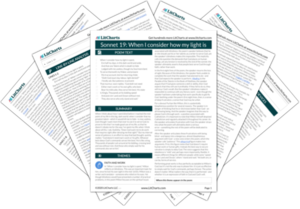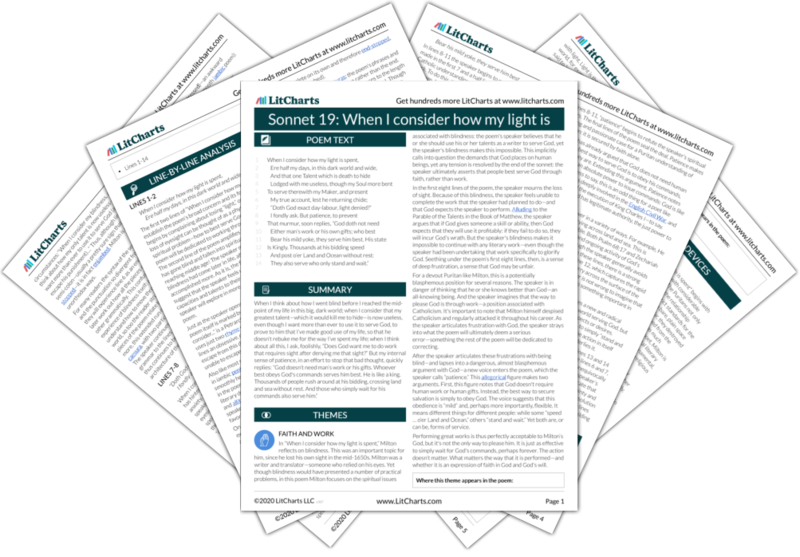

Download this entire guide to “Sonnet 19: When I consider how my light is spent (On his blindness)” as a printable PDF. Download this LitChart! (PDF)
Question about this poem? Have a question about this poem? Have a specific question about this poem? Have a specific question about this poem? Have a specific question about this poem? A LitCharts expert can help. A LitCharts expert can help. A LitCharts expert can help. A LitCharts expert can help. A LitCharts expert can help. Ask a question Ask a question Ask a question“Sonnet 19,” more commonly called "When I consider how my light is spent," is a poem by the English poet John Milton. Likely written in the mid-1650s, after Milton lost his eye-sight, the poem reflects on the physical and spiritual challenges the speaker faces as a blind person. He feels unable to complete the tasks that God has set for him, and worries that he is squandering his capacity to serve God. But, in the second half of the poem, the speaker reassures himself by arguing that God does not need human help and that there are many ways to serve him. Like some of Milton’s other poems (for example, “How Soon Hath Time”), the poem thus defends a Protestant position: the idea that salvation comes from faith, rather than work.

Get the entire guide to “Sonnet 19: When I consider how my light is spent (On his blindness)” as a printable PDF.
1 When I consider how my light is spent,
2 Ere half my days, in this dark world and wide,
3 And that one Talent which is death to hide
4 Lodged with me useless, though my Soul more bent
5 To serve therewith my Maker, and present
6 My true account, lest he returning chide;
7 “Doth God exact day-labour, light denied?”
8 I fondly ask. But patience, to prevent
9 That murmur, soon replies, “God doth not need
10 Either man’s work or his own gifts; who best
11 Bear his mild yoke, they serve him best. His state
12 Is Kingly. Thousands at his bidding speed
13 And post o’er Land and Ocean without rest:
14 They also serve who only stand and wait.”
1 When I consider how my light is spent,
2 Ere half my days, in this dark world and wide,
3 And that one Talent which is death to hide
4 Lodged with me useless, though my Soul more bent
5 To serve therewith my Maker, and present
6 My true account, lest he returning chide;
7 “Doth God exact day-labour, light denied?”
8 I fondly ask. But patience, to prevent
9 That murmur, soon replies, “God doth not need
10 Either man’s work or his own gifts; who best
11 Bear his mild yoke, they serve him best. His state
12 Is Kingly. Thousands at his bidding speed
13 And post o’er Land and Ocean without rest:
14 They also serve who only stand and wait.”




And that one Talent which is death to hide
Lodged with me useless, though my Soul more bent
To serve therewith my Maker, and present
My true account, lest he returning chide;








But patience, to prevent
That murmur, soon replies, “God doth not need
Either man’s work or his own gifts; who best
Bear his mild yoke, they serve him best.




His state
Is Kingly.
Thousands at his bidding speed
And post o’er Land and Ocean without rest:
They also serve who only stand and wait.”








































1 When I consider how my light is spent,
2 Ere half my days, in this dark world and wide,
3 And that one Talent which is death to hide
4 Lodged with me useless, though my Soul more bent
5 To serve therewith my Maker, and present
6 My true account, lest he returning chide;
7 “Doth God exact day-labour, light denied?”
8 I fondly ask. But patience, to prevent
9 That murmur, soon replies, “God doth not need
10 Either man’s work or his own gifts; who best
11 Bear his mild yoke, they serve him best. His state
12 Is Kingly. Thousands at his bidding speed
13 And post o’er Land and Ocean without rest:
14 They also serve who only stand and wait.”
Get instant explanations to your questions about anything we cover.
Powered by LitCharts content and AI.
AI Tools for on-demand study help and teaching prep.
 Quote explanations, with page numbers, for over 44,123 quotes.
Quote explanations, with page numbers, for over 44,123 quotes. PDF downloads of all 1,994 LitCharts guides.
PDF downloads of all 1,994 LitCharts guides. Expert analysis to take your reading to the next level.
Expert analysis to take your reading to the next level. Advanced search to help you find exactly what you're looking for.
Advanced search to help you find exactly what you're looking for.
 Expert analysis to take your reading to the next level.
Expert analysis to take your reading to the next level. Advanced search to help you find exactly what you're looking for.
Advanced search to help you find exactly what you're looking for.